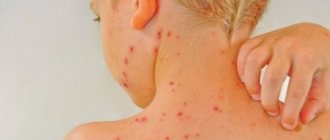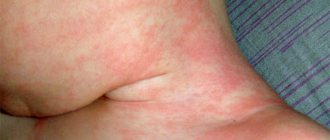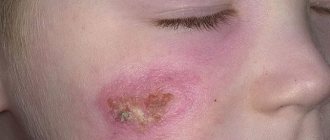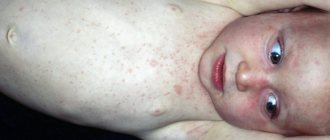Symptoms of infection
If you do not consult a doctor in a timely manner, various consequences may arise that threaten the child’s life. Most often, the virus in a newborn manifests itself in the form of stomatitis and herpes appears on the baby’s lip. In addition, clear blisters can be found in the mouth, tongue, cheeks and palate. It is important to suspect their appearance at an early stage and immediately consult a doctor.
As a rule, when a child is six months old, maternal antibodies are not enough to overcome the virus. Namely, it is at this time that teeth are cutting through, against the background of which immunity decreases and it is much easier for infections to penetrate into the baby’s oral cavity. You can suspect the appearance of herpes in newborns if you look into the baby’s mouth.
The characteristic signs of the disease are the following:
- redness inside the mouth, which over time gives way to transparent blisters;
- the appearance of a white coating;
- itching
Also, with a herpes infection, the baby's lymph nodes may increase in size. Any attentive parent will be able to suspect if something is wrong with their child.
The external symptoms of herpes in an infant include the following features in his behavior and health:
- refusal to eat;
- tearfulness;
- increased restlessness;
- excessive sleepiness;
- convulsions;
- whims.
Causes and types of herpes infection
It is worth knowing that the herpes virus can be transmitted to other people. The incubation period of this disease lasts from 2 days to 3 weeks. Most often, children under one year of age are carriers of the virus due to the fact that it is transmitted to them by airborne droplets during conversations, hugs and kisses of relatives. The virus can also be transmitted through infection from the birth canal if it was detected in the mother before the birth of the child.
Congenital herpes appears if a woman becomes a carrier of the infection in the second trimester of pregnancy and is not treated. If the child is infected while moving through the birth canal, the acute course of the disease lasts for 2 weeks. In some babies, such a disease may begin to develop only towards the end of the first month of life.
If congenital herpes occurs, one of the following forms of infection may develop:
- Generalized form. The reasons for the development of this disease include fever, shortness of breath, frequent regurgitation and malaise. Patients often develop signs of pneumonia and suffer kidney and liver damage. It is worth knowing that sometimes in children the disease occurs without the appearance of rashes.
- Localized form. With this disease, the mucous membranes of the mouth, eyes, and skin of the baby are affected. A distinctive symptom of this form of the disease is the appearance of blisters, which, with adequate treatment, disappear after a month.
- Amazing form. This is one of the dangerous forms of the disease that can affect other systems and organs, including the baby’s nervous system. The main symptoms of the disease may include trembling and convulsions of the baby.
The disease also appears in the child if the mother does not follow the rules of personal care. The virus can be transmitted through dishes, towels and toys. If one of the family members has herpes on the lips, it can be passed on to the newborn baby.
Many people believe that the herpes virus appears in children only because children are not vaccinated against this infection. In fact, there is no vaccine against herpes, and you can protect yourself from its penetration into the body only by strengthening your immune system. There is only a vaccine against chickenpox, which is also herpes.
As medical practice shows, herpes infection most often develops in girls. In order to avoid this, the mother must take care of hygiene during pregnancy and after the birth of the child.
Useful tips
Consider the following recommendations:
- Throughout the treatment, the child must have an enhanced drinking regime.
- Removing drying herpetic crusts (especially with chickenpox) is strictly prohibited - a secondary bacterial infection may develop, and scars may remain on the skin.
- A child is considered contagious from the first acute symptoms and ceases to pose a danger to other children after the rash disappears.
- The presence of a herpes infection in the latent stage is not a reason to postpone preventive vaccinations . They are temporarily postponed until recovery in case of acute herpetic disease. After recovery, the child can be vaccinated according to the national vaccination schedule.
- After recovery, parents should pay special attention to strengthening the baby's immunity . If the body's defenses are strong, then relapse is unlikely. The baby must eat properly and complementary foods should be introduced at the right time.
Children under one year old should spend as much time as possible outdoors. A certain temperature regime should be maintained in the apartment - no higher than 20 degrees. A good way to prevent relapses of herpes is hardening, which parents can practice almost immediately after the baby is born.
medical reviewer, psychosomatics specialist, mother of 4 children
Diagnostics
As a rule, the primary diagnosis of herpes infection can be carried out by the child’s mother or father. Distinctive features of this diagnosis include restless behavior of the baby and the appearance of bubbles filled with liquid.
In order to detect the presence of herpes, you need to see a doctor and undergo the following tests:
- blood;
- urine;
- cerebrospinal fluid.
If an infant develops discharge from the eyes or nose, this should also be collected and sent for examination. It is also recommended to conduct electron microscopy, polymerase chain reaction and examination of internal organs for damage.
How to treat herpes
If the herpes virus is confirmed in a newborn, the doctor will prescribe treatment. Do not ignore your doctor's recommendations in order to avoid serious complications or death. As a rule, infant death occurs in 30% of cases when the disease is diagnosed.
To combat the virus, it is necessary to use the antiviral ointment Acyclovir, which must be applied to the affected areas. Your doctor may also prescribe the use of gels or creams. In order to enhance the effectiveness of drug therapy, the infectious disease specialist prescribes tablets containing the same substance. In some cases, the doctor prescribes anticonvulsants to the child, depending on the symptoms of the disease.
Important! For serious illnesses, the doctor prescribes intravenous medication. An infectious disease specialist may also prescribe the use of Interferon to combat herpes.
Also, if rashes appear, the specialist recommends means to dry out the ulcers. Most often, for this, the doctor prescribes iodine, brilliant green or zinc paste, which has a positive effect on sores. You should not use hormonal ointments, which can cause the blisters to enlarge.
If treatment is started in a timely manner, serious complications can be avoided. But you need to prepare for the fact that it can be long. The doctor must prescribe an individual recovery plan for his patient in order to remove the virus completely from the body. The main treatment for herpes in children under one year of age should be strengthening the immune system and restoring the body's defenses.
It is worth knowing that the disease can go away on its own even without complex treatment. However, there is no need to rejoice too early, the disease can go into a chronic stage, and with provoking factors, it can appear in a severe degree.
In this case, herpes can occur on different human organs. Most often, with secondary infection, the virus manifests itself on the genitals, eyes, skin and mucous membranes. As practice shows, relapses of herpes appear in approximately 50% of cases in infants and are dangerous. In this regard, many mothers ask: is it possible to remove the virus from the body? Yes, you can if you start getting healthy in time.
Advice! Dr. Komarovsky recommends drug treatment only if herpes is detected at a late stage. If the child’s immunity is strong, he himself will be able to resist the virus, and in this case there is no need to use chemicals.
Preventive actions
The herpes virus is quickly transmitted to a child from a sick person. In this regard, to prevent the baby from getting sick, it is necessary to take the necessary preventive measures:
- treatment of genital infections of parents at the stage of pregnancy planning;
- in case of infection of the expectant mother, therapy in the 3rd trimester of pregnancy;
- caesarean section for genital herpes in a woman in labor;
- compliance with the rules of personal hygiene and child hygiene;
- isolating the baby from the sick;
- maintaining cleanliness in the children's room and daily ventilation of the room;
- breastfeeding for at least a year;
- contact a specialist at the first signs of herpes.
How dangerous is the herpes virus for a child?
Not all people know whether the herpes virus is dangerous for babies and what will happen if you ignore its appearance. If the infection is not dealt with, it can lead to worsening of the condition and complications.
Diseases that occur after untreated herpes are:
- Herpes eye. The main symptoms of this disease include lacrimation, redness around the eyes, itching and pain. If treatment is not started, the cornea may become cloudy, leading to blindness in the child.
- Kaposi's eczema. This disease requires urgent hospitalization of the patient in a hospital, as it often leads to death. The main symptoms of the disease are an increase in body temperature up to 40 degrees, severe itching, and the appearance of blisters throughout the body.
- Encephalitis. This disease is characterized by the penetration of infection into the brain through the intrauterine route. In this case, urgent hospitalization of the patient is also necessary.
- Panaritium caused by herpes. In this case, inflammation of the finger occurs, in which the virus penetrates through damaged skin. The main signs of this disease include swelling, redness and painful sensations in the limbs.
Herpes in newborns is much more complex than in adults. The danger of infection lies in the fact that the disease can affect the nervous system and internal organs of a small patient. The disease can lead to sudden loss of hearing, vision, as well as lack of reproductive function if the genital organs are affected.
Prevention of infection
Equally important is the prevention of herpes in a newborn baby. Moreover, preventive methods must be followed even before the baby is born. Expectant parents should adopt a healthy lifestyle, have sex only with a single partner, and avoid contact with infected people. The expectant mother should constantly strengthen her immunity and eat right.
After the birth of the baby, you need to carefully monitor the condition of his skin. If any rashes appear, you should consult a doctor so as not to miss the onset of the disease. You should not allow strangers or those who have been diagnosed with the herpes virus to approach your child. It is also necessary to monitor the cleanliness of the baby’s diapers, bedding and clothes.
5 / 5 ( 1 voice )
Treatment
First of all, the doctor prescribes the following drugs:
- suppressing viruses - Acyclovir for topical use (ointment), solution, Zovirax - in the form of an ointment;
- antihistamines – Suprastin;
- healing and drying skin rashes - brilliant green, Fukortsin, sulfur-based ointments;
- immunomodulatory, immunostimulating – Pentoxyl, Immunal, Lysozyme, Fiferon, Interferon;
- antiseptic – Chlorhexidine, Miramistin;
- painkillers - Panadol, Nurofen in the form of suppositories and suspensions;
- in some cases, the doctor prescribes anticonvulsants.
Acyclovir and Zovirax
To quickly heal wounds and relieve inflammation and burning itching, you can use a decoction of chamomile, celandine, calendula, rosehip oil, sea buckthorn, and an oily solution of vitamin A.
Throughout the treatment, the baby needs to be given plenty of water. A mother who is breastfeeding should carefully monitor her diet and include foods rich in vitamins in her menu. To prevent your baby from scratching or scratching the pimples (which can become secondarily infected), you need to use special handle pads, or scratch pads. It is also important to isolate the baby from other children, as well as personal hygiene of mother and baby.
To avoid frequent relapses, you should strengthen your baby’s immunity. From the first months of life, you need to accustom him to hardening, walk more in the fresh air, maintain optimal temperature and humidity in his room.











